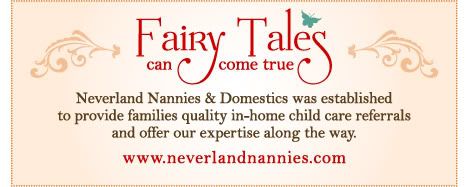Nanny agreements are probably one of the best investments you can make when hiring a nanny.
Being an advocate for nanny/employer agreements, I strongly believe that not only does it protect the family's rights, but it equally does so for the nanny, creating a better understanding of what is to be expected from both parties.
As every nanny employer knows, at some point along their journey with their nanny, there tends to be a discrepancy as to what the expectations of the job are.
An employer feels as though they pay their nanny a good amount of money to take care of their children and in their opinion, the nanny should have to complete any tasks within reason, that the employer would take on if he/she were to be staying at home with their own child.
From the nanny's viewpoint, their profession is to be working with children. Many professional nannies have take early childhood education courses, have been watching children for 10, 15 and even 20+ years, and have worked extremely hard to get to where they are at, without having to clean bathrooms and mop kitchen floors. As you can see, there lies the discrepancy.
So what is the right answer? There really isn't a right and a wrong. Every family is different from the next and the same goes with each nanny. And although I cannot fully side with either one, I do believe there is the perfect match for every personality type and neither party should settle until they find a situation that is right for them. You should be able to have a good idea whether or not you've met a great nanny/family through a trial period prior to offering/accepting a permanent position.
Another way you can determine whether or not you have found a great match is "when both parties have reviewed the agreement, entailing both parties expectations and each were happy to sign off on it."
Think about it. You both have to keep each other happy. Perhaps, you do so by having the nanny agree to accepting additional job responsibilities every year and in return, you provide her with a merit increase. Domestic employment is just as much of a profession as is being a teacher or a doctor.
Another great aspect the nanny agreement provides is the reducing much of the gray areas that could arise, which potentially cause tension between the family and the nanny. For example, The Robinson family has decided to go on a summer vacation for two weeks with the children. Legally, the family is not required to pay them during that time; not to mention they are already dolling out a significant amount of money for their trip. They decide not to pay their nanny while they are gone.
Realistically, a nanny is dependent on their paycheck. She's just received word that her family is going out of town for two weeks and she will not be receiving pay during that time [on a side note, I should mention this happens quite often].
As much as the nanny loves her family, she is terribly upset knowing she is going to be without pay for two weeks and in her mind, it's almost like a suspension. Had the nanny known that her family was not going to pay her for the times they went out of town, she very well may not have accepted the position...so she starts looking for a new family, knowing now that she is to have it in writing with her next employer.
Unfortunately, when the family returns, they discover their nanny has left them for another family and are now without a nanny themselves. The question you must ask yourself is "Was it worth it?"
On the flip side, some believe a nanny agreement to be a disadvantage. According to an article written in The Washington Post,
A nanny agreement can be beneficial in many reasons but mainly, to outline the overall expectations of the job, salary, vacation pay, notice prior to termination
The Nanny Diaries offers the skinny on the latest in Nanny News, current events, Q&A regarding Domestic Employment, contests, giveaways and more.

- 'Tis the Season (3)
- A Better Nanny (3)
- Baby Nurses (1)
- child care (1)
- child photography (2)
- domestic employment (2)
- Employment Opportunities (2)
- memberships/affiliations (1)
- nannies (1)
- nannies and childcare (14)
- nanny agency (1)
- nanny of the year (2)
- Payroll and Earnings (2)
- pregnancy (1)
- tales to tell (8)

We can't thank you enough for your help. You were so supportive right when we needed it. Thank You, thank you!"
~Weiss Family, Orange County, CA. (Baby Nurse, newborn twins)
"Michelle knew exactly what we were looking for and has helped us out on more than one occasion. She is personable, honest and professional; We could not ask for a greater experience."
~The Russo Family, Beverly Hills, CA. (Baby Nurse & Live-In Nanny)
"Neverland has made a wonderful name for itself. We trust you with our family and that says a lot."
~The Bernstein's, Westlake, CA. (Full Charge Housekeeper)













No comments:
Post a Comment